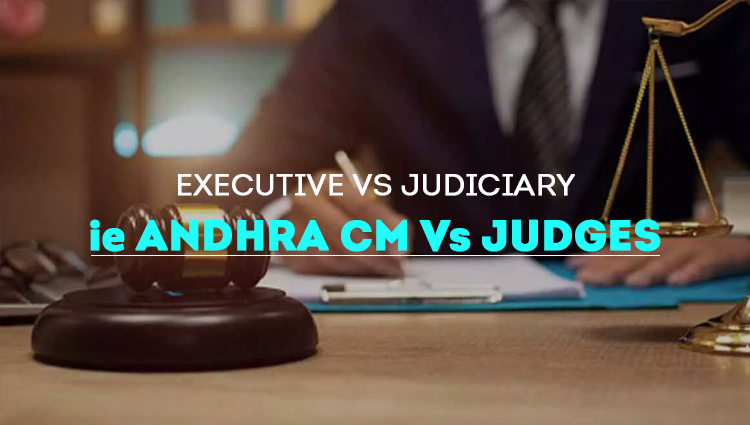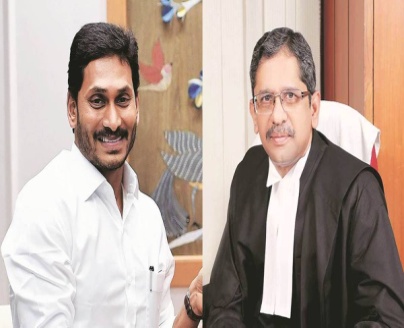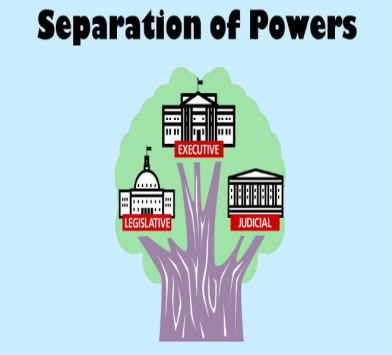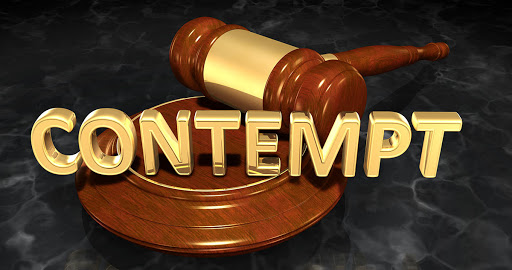
EXECUTIVE Vs JUDICIARY ie ANDHRA CM Vs JUDGES
EXECUTIVE V. JUDICIARY (ANDHRA CM V. JUDGES)
Recently, Andhra Pradesh Chief Minister Y.S. Jagan Mohan Reddy has stirred a hornet’s nest by writing to the Chief Justice of India (CJI) complaining about Supreme Court (SC) Judge, Justice N.V. Ramana.
ALLEGATIONS LEVELED IN THE LETTER

Mr. Jagan said that Justice Ramana was a legal adviser and additional advocate-general in the previous government of the TDP. AP CM has alleged that SC judge Justice N.V. Ramana (next in line to become CJI as per seniority) had been influencing the sittings and posting of cases in the State High Court. AP CM has also cited instances of how matters important to the opposition Telugu Desam Party had been ‘allocated to a few judges’ and that some High Court judges are hostile to his government & deliberately striking down his government orders. In effect, he has accused many judges of misconduct, corruption and political bias. In view of the above, the Chief Minister urged the Chief Justice of India to consider initiating steps to ensure that the State’s judicial neutrality was maintained.
ALLEGATIONS OF MISCONDUCT AGAINST JUDGES
The Constitution protects the independence of judges of the High Courts and the Supreme Court by making them removable only through a long process of impeachment. However, not all forms of misconduct will warrant impeachment. There could be other kinds of impropriety too. There are times when serious complaints of this sort are received, and the CJI is called upon to examine them. Since 1997, judges have adopted an ‘in-house procedure’ for inquiring into such charges.
PROCEDURE ADOPTED IN THE CASE
• After Justice J.S. Verma took over as CJI in 1997, he circulated among judges a document called ‘Restatement of Values of Judicial life’. This was a set of principles containing the essential elements of ideal behavior for judges. The Full Court passed a resolution that an ‘in-house procedure’ would be adopted for action against judges for acts of commission or omission that go against these values. A five-judge committee was constituted to come up with a procedure. Its report was adopted on December 15, 1999. It was made public in 2014.
• When a complaint is received against a High Court judge, the CJI should decide if it is considered frivolous or if it is serious and “directly related to the merits of a substantive decision in a judicial matter”. If it is serious, the CJI should get the judge’s response. He may close the matter if he is satisfied with the response. If a deeper probe is considered necessary, CJI may form a three-member committee to better investigate the case.
CONSEQUENCES OF THE CONTROVERSY

• If the committee finds substance in the charges, it can give recommendations such as if the misconduct is serious enough to require removal from office, or that it is not serious enough to warrant removal. In the former case, the judge concerned will be urged to resign or seek voluntary retirement. If the judge is unwilling to quit, the Chief Justice of the High Court concerned would be asked to withdraw judicial work from him.
• Impacts Democratic Functioning: Such type of confrontation and mistrust between two organs of State is not conducive for smooth working of Democracy. The ultimate victim will be the common man who will be bereft of better governance & Integrity of SC Judges is may also be doubted as such type of allegations and counter allegations will create doubts in minds of Public about the ability to get justice from Formal system.
• Politicization of Judiciary: The serious accusation by a sitting Chief Minister brings out to the foreground the weakness of Judiciary. Similar kinds of charges might be leveled by opposition parties when it comes to power. All these lead to politicization of the Institution of Judiciary.
• Judiciary’s Grievance Redressal Mechanism tested: How the CJI & SC is going to handle this case will set a precedent to deal with misconduct of Judges in future. If the process is not robust, fair & transparent then the calls for greater executive control on Judiciary will increase (Judicial Standards and Accountability Bill).
CONTEMPT OF COURT

• Now after a week of the complaint filed, an application has been filed before the Attorney General of India seeking his consent to initiate criminal contempt proceedings against the Chief Minister of Andhra Pradesh, Y S Jagan Mohan Reddy. The application for seeking consent to initiate criminal contempt is for making public allegations against Justice NV Ramana, judge of the Supreme Court.
• Contempt of court, often referred to simply as "contempt", is the offense of being disobedient to or disrespectful toward a court of law and its officers in the form of behavior that opposes or defies the authority, justice and dignity of the court. It is essentially seen as a form of disturbance that may impede the functioning of the court. A similar attitude towards a legislative body is termed contempt of Parliament or contempt of Congress.
CONSTITUTIONAL BACKGROUND
The expression ‘contempt of court’ has not been clearly mentioned in the Constitution.
• Article 129: Grants Supreme Court the power to punish for contempt of itself. Whereas Article 19(1) (a) of the Constitution gives the right to freedom of speech and expression to all citizens, while “contempt provisions” curb people’s freedom to speak against the court’s functioning.
• Article 142(2): Enables the Supreme Court to investigate and punish any person for its contempt.
• Article 215: Grants every High Court the power to punish for contempt of itself.
As per the Contempt of Courts Act 1971, contempt refers to the offence of showing disrespect to the dignity or authority of a court. The act defines the power of courts to punish for their contempt and regulates their procedure.
• Civil contempt: It is willful disobedience to any judgment, decree, direction, order, writ or other processes of a court or willful breach of an undertaking given to the court.
• Criminal contempt: It is any publication which may result in scandalizing the court by lowering its authority. Interference in the due course of a judicial proceeding. An obstruction in the administration of justice.
QUESTIONS (1-5)
Q.1 Recently, Which of the following Chief Ministers have made allegations of misconduct against judges and wrote a complaint to CJI?
A. Pinarayi Vijayan
B. Y.S. Jagan Mohan Reddy: ANSWER
C. N. Chandra Babu Naidu
D. K. Chandrashekar Rao
Q.2 Which of the following Articles mentions the removal of Judge of the Supreme Court on the ground of proved misbehavior or incapacity?
A. Article 124(1)
B. Article 124(2)
C. Article 124(4): ANSWER
D. Article 142
Q.3 The Collegium System which is responsible for the appointment of judges of the Supreme Court consists of how many members?
A. Four members:- CJI and Three senior most judges of Supreme Court
B. Three members:- CJI and Two senior most judges of Supreme Court
C. Five members:- CJI and Four senior most judges of Supreme Court: ANSWER
D. None of the above
Q.4 Which of the following Article of the Constitution grants Supreme Court the power to punish for contempt of itself?
A. Article 127
B. Article 135
C. Article 126
D. Article 129: ANSWER
Q.5 Which of the following acts defines the power of courts to punish for their contempt and also divided it into Civil & Criminal contempt?
A. Contempt of Courts Act, 1955
B. Contempt of Courts Act, 1961
C. Contempt of Courts Act, 1971: ANSWER
D. Contempt of Courts Act, 1975












0 Comment